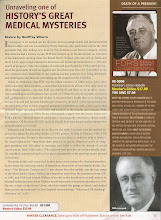FDR was not the only president to manipulate the press about his health. Here is an anecdote from an extremely reliable source, a high-ranking naval physician, now retired.
After his September 1965 gall bladder surgery, Lyndon Baines Johnson is infamous for showing "spontaneously" showing his scar to the press. For this act, history remembers him as a hayseed with a lack of social graces.
The truth is quite different! It has never been published.
LBJ was with his close confidante, Jack Valenti, at Bethesda Naval Hospital after the surgery that had been performed at Bethesda by Dr. George A. Hallenbeck, chief of surgery at the Mayo Clinic. The president asked Valenti about the publicity surrounding the operation and was told that there was a problem. A rumor was circulating among the press that LBJ was operated on not for his gall bladder but for cancer.
Johnson immediately called Dr. Hallenbeck and asked him if the incision he made would be recognized as one for a gall bladder resection. Hallenbeck replied to the affirmative. LBJ then inquired what type of incision would be made for exploratory cancer surgery. The surgeon informed him that in this case it would extend in the midline from from just below the the breast bone to the pubic area.
Johnson immediately called a press conference that was conducted on the hospital heliport. The photo above was taken at this time.
After the conference, Johnson returned to his room and exclaimed to Valenti "That's one rumor taken care of!".
History corrected, hopefully a lot easier than with LBJ's predecessor.







